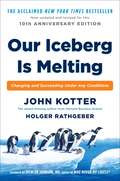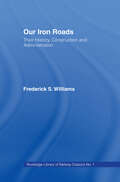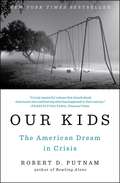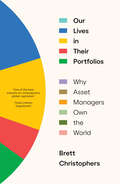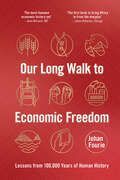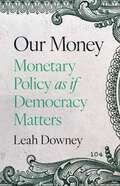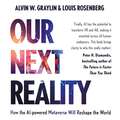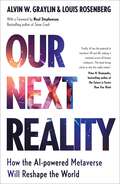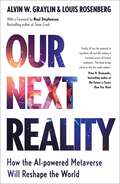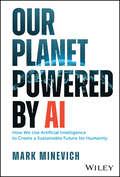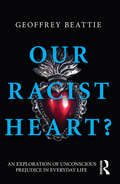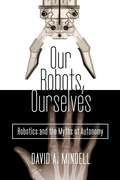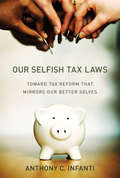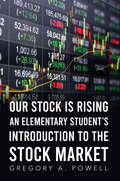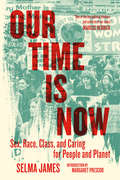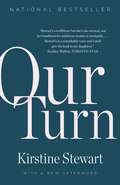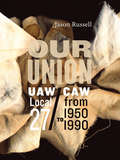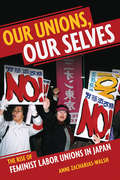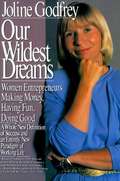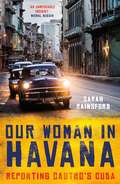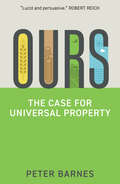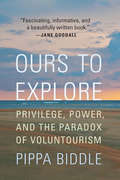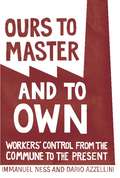- Table View
- List View
Our Iceberg Is Melting: Changing and Succeeding Under Any Conditions
by Holger Rathgeber John KotterA new edition of the classic business parable that has sold more than a million copies since 2006. Our Iceberg Is Melting is a simple fable about doing well in an ever-changing world. Based on the award-winning work of Harvard’s John Kotter, it is a story that has been used to help thousands of people and organizations. The fable is about a penguin colony in Antarctica. A group of beautiful emperor penguins live as they have for many years. Then one curious bird discovers a potentially devastating problem threatening their home—and pretty much no one listens to him. The characters in the story, Fred, Alice, Louis, Buddy, the Professor, and NoNo, are like people we recognize—even ourselves. Their tale is one of resistance to change and heroic action, seemingly intractable obstacles and the most clever tactics for dealing with those obstacles. It’s a story that is occurring in different forms all around us today—but the penguins handle the very real challenges a great deal better than most of us. Our Iceberg Is Melting is based on pioneering work that shows how Eight Steps produce needed change in any sort of group. It’s a story that can be enjoyed by anyone while at the same time providing invaluable guidance for a world that just keeps moving faster and faster.From the Hardcover edition.
Our Iron Roads: Their History, Construction and Administraton
by F.S. WilliamsFirst published in 1968. Routledge is an imprint of Taylor & Francis, an informa company.
Our Kids: The American Dream in Crisis
by Robert D. PutnamA groundbreaking examination of the growing inequality gap from the bestselling author of Bowling Alone: why fewer Americans today have the opportunity for upward mobility.It's the American dream: get a good education, work hard, buy a house, and achieve prosperity and success. This is the America we believe in--a nation of opportunity, constrained only by ability and effort. But during the last twenty-five years we have seen a disturbing "opportunity gap" emerge. Americans have always believed in equality of opportunity, the idea that all kids, regardless of their family background, should have a decent chance to improve their lot in life. Now, this central tenet of the American dream seems no longer true or at the least, much less true than it was. Robert Putnam--about whom The Economist said, "his scholarship is wide-ranging, his intelligence luminous, his tone modest, his prose unpretentious and frequently funny"--offers a personal but also authoritative look at this new American crisis. Putnam begins with his high school class of 1959 in Port Clinton, Ohio. By and large the vast majority of those students--"our kids"--went on to lives better than those of their parents. But their children and grandchildren have had harder lives amid diminishing prospects. Putnam tells the tale of lessening opportunity through poignant life stories of rich and poor kids from cities and suburbs across the country, drawing on a formidable body of research done especially for this book. Our Kids is a rare combination of individual testimony and rigorous evidence. Putnam provides a disturbing account of the American dream that should initiate a deep examination of the future of our country.
Our Lives in Their Portfolios: Why Asset Managers Own the World
by Brett ChristophersAll hail the new masters of Capitalism: How asset managers acquired the world Banks have taken a backseat since the global financial crisis over a decade ago. Today, our new financial masters are asset managers, like Blackstone and BlackRock. And they don&’t just own financial assets. The roads we drive on; the pipes that supply our drinking water; the farmland that provides our food; energy systems for electricity and heat; hospitals, schools, and even the homes in which many of us live—all now swell asset managers&’ bulging investment portfolios. As the owners of more and more of the basic building blocks of everyday life, asset managers shape the lives of each and every one of us in profound and disturbing ways. In this eye-opening follow-up to Rentier Capitalism, Brett Christophers peels back the veil on &“asset manager society.&” Asset managers, he shows, are unlike traditional owners of housing and other essential infrastructure. Buying and selling these life-supporting assets at a dizzying pace, the crux of their business model is not long-term investment and careful custodianship but making quick profits for themselves and the investors that back them. In asset manager society, the natural and built environments that sustain us become one more vehicle for siphoning money from the many to the few.
Our Long Walk to Economic Freedom: Lessons from 100,000 Years of Human History
by Johan FourieOur Long Walk to Economic Freedom is an entertaining and engaging guide to global economic history told for the first time from an African perspective. In thirty-five short chapters Johan Fourie tells the story of 100,000 years of human history spanning humankind's migration out of Africa to the Covid-19 pandemic. His unique account reveals just how much we can learn by asking unexpected questions such as 'How could a movie embarrass Stalin?', 'Why do the Japanese play rugby?' and 'What do an Indonesian volcano, Frankenstein and Shaka Zulu have in common?'. The book sheds new light on urgent debates about the roots and reasons for prosperity, the march of opportunity versus the crushing boot of exploitation, and why it is the builders of society – rather than the burglars –who ultimately win out.
Our Money: Monetary Policy as if Democracy Matters
by Leah Rose Ely DowneyHow the creation of money and monetary policy can be more democraticThe power to create money is foundational to the state. In the United States, that power has been largely delegated to private banks governed by an independent central bank. Putting monetary policy in the hands of a set of insulated, nonelected experts has fueled the popular rejection of expertise as well as a widespread dissatisfaction with democratically elected officials. In Our Money, Leah Downey makes a principled case against central bank independence (CBI) by both challenging the economic theory behind it and developing a democratic rationale for sustaining the power of the legislature to determine who can create money and on what terms. How states govern money creation has an impact on the capacity of the people and their elected officials to steer policy over time. In a healthy democracy, Downey argues, the balance of power over money creation matters.Downey applies and develops democratic theory through an exploration of monetary policy. In so doing, she develops a novel theory of independent agencies in the context of democratic government, arguing that states can employ expertise without being ruled by experts. Downey argues that it is through iterative governance, the legislature knowing and regularly showing its power over policy, that the people can retain their democratic power to guide policy in the modern state. As for contemporary macroeconomic arguments in defense of central bank independence, Downey suggests that the purported economic benefits do not outweigh the democratic costs.
Our Next Reality: How the AI-powered Metaverse Will Reshape the World
by Alvin Wang Graylin Louis Rosenberg"Our Next Reality does a fantastic job of giving a balanced and insightful analysis to some of the most pressing questions our society will face in the near future. The material is data driven, digestible, and very actionable." RAY KURZWEIL, Author/Entrepreneur/Futurist"A wide-reaching exploration of the intersections between AI, VR and AR: it's a mind-opener, and a source of reflection on how transformative and still unknown the future of communication, personal technology and even personal privacy might become." SCOTT STEIN, Editor at Large, CNETOver the last 100 years, technology has changed our world. Over the next decade it will transform our reality.We are entering a new technological age in which artificial intelligence and immersive media will transform society at all levels, mediating our lives by altering what we see, hear, and experience. Powered by immersive eyewear and driven by interactive AI agents, this new age of computing has the potential to make our world a magical place where the boundaries between the real and the virtual, the human and the artificial, rapidly fade away. If managed well, this could unleash a new age of abundance. If managed poorly, this technological revolution could easily go astray, deeply compromising our privacy, autonomy, agency, and even our humanity.In Our Next Reality, two industry veterans provide a data-driven debate on whether the new world we're creating will be a technological utopia or an AI-powered dystopia and give guidance on how to aim for the best future we can. With a Foreword by renowned author Neal Stephenson and section contributions from industry thought-leaders such as Peter H. Diamandis, Tom Furness, Phillip Rosedale, Tony Parisi, Avi Bar Zeev and Walter Parkes, this book answers over a dozen of the most pressing questions we face as artificial intelligence and spatial computing accelerates the digitization of our world. Find out why our actions in the next decade could determine the trajectory of our species for countless millennia."For anyone who wants to use AI and XR to help build the future, read this book to help you skillfully navigate a future of unprecedented danger and promise." JASON HINER, Editor in Chief, ZDNet"Our Next Reality really is a must-read for anyone who wants to prepare for the massive AI and XR driven disruption coming our way." CHARLIE FINK, Author | Adjunct | Forbes Tech Columnist
Our Next Reality: How the AI-powered Metaverse Will Reshape the World
by Alvin Wang Graylin Louis RosenbergForeword by Neal Stephenson, bestselling author of Snow Crash Over the last 100 years, technology has changed our world. Over the next decade it will transform our reality. The planet is headed for a momentous upheaval, and we are not prepared. We are entering a new technological age in which artificial intelligence and immersive media will transform society at all levels, mediating our lives by altering what we see, hear, and experience. Powered by immersive eyewear and driven by interactive AI agents, this new age of computing has the potential to make our world a magical place where the boundaries between the real and the virtual, the human and the artificial, rapidly fade away. If managed well, this could unleash a new age of abundance. If managed poorly, this technological revolution could easily go astray, deeply compromising our privacy, autonomy, agency, and even our humanity. In Our Next Reality, two industry veterans provide a data-driven debate on whether the new world we're creating will be a technological utopia or an AI-powered dystopia and give guidance on how to aim for the best future we can. With a Foreword by renowned author Neal Stephenson and section contributions from industry thought-leaders such as Peter H. Diamandis, Tom Furness, Phillip Rosedale, Tony Parisi, Avi Bar Zeev and Walter Parkes, this book answers over a dozen of the most pressing questions we face as AI/VR/AR accelerates the digitization of our world. Find out why our actions in the next decade could determine the trajectory of our species for countless millennia.
Our Next Reality: How the AI-powered Metaverse Will Reshape the World
by Alvin Wang Graylin Louis Rosenberg"Our Next Reality does a fantastic job of giving a balanced and insightful analysis to some of the most pressing questions our society will face in the near future. The material is data driven, digestible, and very actionable." RAY KURZWEIL, Author/Entrepreneur/Futurist"A wide-reaching exploration of the intersections between AI, VR and AR: it's a mind-opener, and a source of reflection on how transformative and still unknown the future of communication, personal technology and even personal privacy might become." SCOTT STEIN, Editor at Large, CNETOver the last 100 years, technology has changed our world. Over the next decade it will transform our reality.We are entering a new technological age in which artificial intelligence and immersive media will transform society at all levels, mediating our lives by altering what we see, hear, and experience. Powered by immersive eyewear and driven by interactive AI agents, this new age of computing has the potential to make our world a magical place where the boundaries between the real and the virtual, the human and the artificial, rapidly fade away. If managed well, this could unleash a new age of abundance. If managed poorly, this technological revolution could easily go astray, deeply compromising our privacy, autonomy, agency, and even our humanity.In Our Next Reality, two industry veterans provide a data-driven debate on whether the new world we're creating will be a technological utopia or an AI-powered dystopia and give guidance on how to aim for the best future we can. With a Foreword by renowned author Neal Stephenson and section contributions from industry thought-leaders such as Peter H. Diamandis, Tom Furness, Phillip Rosedale, Tony Parisi, Avi Bar Zeev and Walter Parkes, this book answers over a dozen of the most pressing questions we face as artificial intelligence and spatial computing accelerates the digitization of our world. Find out why our actions in the next decade could determine the trajectory of our species for countless millennia."For anyone who wants to use AI and XR to help build the future, read this book to help you skillfully navigate a future of unprecedented danger and promise." JASON HINER, Editor in Chief, ZDNet"Our Next Reality really is a must-read for anyone who wants to prepare for the massive AI and XR driven disruption coming our way." CHARLIE FINK, Author | Adjunct | Forbes Tech Columnist
Our Next Reality: How the AI-powered Metaverse Will Reshape the World
by Alvin Wang Graylin Louis Rosenberg"Our Next Reality does a fantastic job of giving a balanced and insightful analysis to some of the most pressing questions our society will face in the near future. The material is data driven, digestible, and very actionable." RAY KURZWEIL, Author/Entrepreneur/Futurist"A wide-reaching exploration of the intersections between AI, VR and AR: it's a mind-opener, and a source of reflection on how transformative and still unknown the future of communication, personal technology and even personal privacy might become." SCOTT STEIN, Editor at Large, CNET"For anyone who wants to use AI and XR to help build the future, read this book to help you skillfully navigate a future of unprecedented danger and promise." JASON HINER, Editor in Chief, ZDNet"Our Next Reality really is a must-read for anyone who wants to prepare for the massive AI and XR driven disruption coming our way." CHARLIE FINK, Author | Adjunct | Forbes Tech ColumnistOver the last 100 years, technology has changed our world. Over the next decade it will transform our reality.We are entering a new technological age in which artificial intelligence and immersive media will transform society at all levels, mediating our lives by altering what we see, hear, and experience. Powered by immersive eyewear and driven by interactive AI agents, this new age of computing has the potential to make our world a magical place where the boundaries between the real and the virtual, the human and the artificial, rapidly fade away. If managed well, this could unleash a new age of abundance. If managed poorly, this technological revolution could easily go astray, deeply compromising our privacy, autonomy, agency, and even our humanity.In Our Next Reality, two industry veterans provide a data-driven debate on whether the new world we're creating will be a technological utopia or an AI-powered dystopia and give guidance on how to aim for the best future we can. With a Foreword by renowned author Neal Stephenson and section contributions from industry thought-leaders such as Peter H. Diamandis, Tom Furness, Phillip Rosedale, Tony Parisi, Avi Bar Zeev and Walter Parkes, this book answers over a dozen of the most pressing questions we face as artificial intelligence and spatial computing accelerates the digitization of our world. Find out why our actions in the next decade could determine the trajectory of our species for countless millennia.
Our Planet Powered by AI: How We Use Artificial Intelligence to Create a Sustainable Future for Humanity
by Mark MinevichA hands-on guide to evolving your company with ethical AI along with thought-provoking insights and predictions from a variety of well-known industry leaders In Our Planet Powered by AI, renowned AI strategist and pioneer Mark Minevich delivers an exciting and practical discussion of how to implement groundbreaking artificial intelligence technologies at every level of your organization. You’ll learn to create sustainable, effective competitive advantage by introducing previously unheard-of levels of adaptability, resilience, and innovation into your company. Using real-world case studies from a variety of well-known industry leaders, the author explains the strategic archetypes, technological infrastructures, and cultures of sustainability you’ll need to ensure your firm’s next-level digital transformation takes root. You’ll also discover: How AI can enable new business strategies, models, and ecosystems of innovation and growth How to develop societal impact and powerful organizational benefits with ethical AI implementations that incorporate transparency, fairness, privacy, and reliability What it means to enable all-inclusive artificial intelligence An engaging and hands-on exploration of how to take your firm to new levels of dynamism and growth, Our Planet Powered by AI will earn a place in the libraries of managers, executives, directors, and other business and technology leaders seeking to distinguish their companies in a new age of astonishing technological advancement and fierce competition.
Our Racist Heart?: An Exploration of Unconscious Prejudice in Everyday Life
by Geoffrey BeattieFew people today would admit to being a racist, or to making assumptions about individuals based on their skin colour, or on their gender or social class. In this book, leading psychologist Geoffrey Beattie asks if prejudice, more subtle than before, is still a major part of our everyday lives. Beattie suggests that implicit biases based around race are not just found in small sections of our society, but that they also exist in the psyches of even the most liberal, educated and fair-minded of us. More importantly, the book outlines how these ‘hidden’ attitudes and prejudices can be revealed and measured, and how they in turn predict behaviours in a number of important social situations. Our Racist Heart? takes a fresh look at our racial attitudes, using new technology and experimental approaches to show how unconscious biases influence our everyday actions and thinking. These groundbreaking results are brought to life using the author’s own experiences of class and religious prejudice in Northern Ireland, and are also discussed in relation to the history of race, racism and social psychological theory.
Our Robots, Ourselves
by David A. Mindell"[An] essential book... it is required reading as we seriously engage one of the most important debates of our time."--Sherry Turkle, author of Reclaiming Conversation: The Power of Talk in a Digital AgeFrom drones to Mars rovers--an exploration of the most innovative use of robots today and a provocative argument for the crucial role of humans in our increasingly technological future. In Our Robots, Ourselves, David Mindell offers a fascinating behind-the-scenes look at the cutting edge of robotics today, debunking commonly held myths and exploring the rapidly changing relationships between humans and machines. Drawing on firsthand experience, extensive interviews, and the latest research from MIT and elsewhere, Mindell takes us to extreme environments--high atmosphere, deep ocean, and outer space--to reveal where the most advanced robotics already exist. In these environments, scientists use robots to discover new information about ancient civilizations, to map some of the world's largest geological features, and even to "commute" to Mars to conduct daily experiments. But these tools of air, sea, and space also forecast the dangers, ethical quandaries, and unintended consequences of a future in which robotics and automation suffuse our everyday lives. Mindell argues that the stark lines we've drawn between human and not human, manual and automated, aren't helpful for understanding our relationship with robotics. Brilliantly researched and accessibly written, Our Robots, Ourselves clarifies misconceptions about the autonomous robot, offering instead a hopeful message about what he calls "rich human presence" at the center of the technological landscape we are now creating. From the Hardcover edition.
Our Selfish Tax Laws: Toward Tax Reform that Mirrors Our Better Selves
by Anthony C. InfantiWhy tax law is not just a pocketbook issue but a reflection of what and whom we, as a society, value. Most of us think of tax as a pocketbook issue: how much we owe, how much we'll get back, how much we can deduct. In Our Selfish Tax Laws, Anthony Infanti takes a broader view, considering not just how taxes affect us individually but how the tax system reflects our culture and society. He finds that American tax laws validate and benefit those who already possess power and privilege while starkly reflecting the lines of difference and discrimination in American society based on race, ethnicity, socioeconomic class, gender, sexual orientation and gender identity, immigration status, and disability. Infanti argues that instead of focusing our tax reform discussions on which loopholes to close or which deductions to allow, we should consider how to make our tax system reflect American ideals of inclusivity rather than institutionalizing exclusion.After describing the theoretical and intellectual underpinnings of his argument, Infanti offers two comparative case studies, examining the treatment of housing tax expenditures and the unit of taxation in the United States, Canada, France, and Spain to show how tax law reflects its social and cultural context. Then, drawing on his own work and that of other critical tax scholars, Infanti explains how the discourse surrounding tax reform masks the many ways that the American tax system rewards and reifies privilege. To counter this, Infanti urges us to work together to create a society with a tax system that respects and values all Americans.
Our Stock Is Rising: An Elementary Student’s Introduction to the Stock Market
by Gregory A. PowellI spent the early years researching the topic. The goal was to teach them as I learned, and to stay one step ahead of my classes. I took them to see the experts at Key Bank and the Wright State University School of Business. As time went on, the experts came to us. The late Ellis Rowe (former VP, Mars, Inc.), and Theo Killion (former CEO, Zales) flew in from Jacksonville and Chicago respectively, just to share a few of their valuable hours for what they both found to be an invaluable experience.This book is written by a teacher, for teachers. Unlike other books of its kind, this one&’s not written by an expert in the field of investment financing. Quite frankly, I saw in this project, such a sense of urgency, that the need for it to be delivered by experts (whenever they became available), was outweighed by the need for it to be delivered in the here and now.Our Stock Is Rising is a metaphor that speaks not just to the disenfranchised, but to all the little kids in all the neighborhoods outside New York&’s famed Financial District. It says that we are not always too young. And that the things we are allowed to be challenged by in our youth, won&’t be the things that deny us a place at the table, as adults.
Our Time Is Now: Sex, Race, Class, and Caring for People and Planet
by Selma JamesFor over sixty years, Selma James has been organizing from the perspective of unwaged women who, with their biological and caring work, reproduce the whole human race—along with whatever other labor they are performing. This work goes on almost unnoticed everywhere on the planet and in every culture. When this work is not economically prioritized, politically protected, or socially supported there are dire consequences for the whole of humanity, beginning with women and children. This much-anticipated follow-up to her first anthology, Sex, Race, and Class, compiles several decades of James's work with a focus on her more recent writings, including a groundbreaking analysis of C.L.R. James's two masterpieces, The Black Jacobins and Beyond a Boundary, and an account of her formative partnership with him over three decades. Her experience with the Caribbean movement for independence and federation is reflected in her introduction to Ujamaa, the extraordinary work of Tanzanians to bypass capitalism, and much more. Steeped in the tradition of Marx, James draws on half a century of organizing across sectors, struggles and national boundaries with others in the Wages for Housework Campaign and the Global Women's Strike, an autonomous network of women, men, and other genders that agree with their perspective. There is one continuum between the care and protection of people and of the planet: both must be a priority, beginning with a care income for everyone doing this vital work. Our time is now.
Our Turn
by Kirstine StewartIn her inspiring, deeply intelligent and intensely practical Our Turn, Kirstine Stewart draws on her own extensive leadership experience to take the conversation about women and work to a whole new level. Simply put: the time is now for new styles of leadership, and women are best-suited to set the pace. Kirstine Stewart got her first job when she applied for a position as a "girl Friday" at a film distribution house. Having worked her way up from the bottom--under women and men, leaders good and bad--she believes it's time we leaped past the question of how women might create change in the working world and exploit the fact that profound change is already under way. The digital revolution, and the wave of millennials who are entering the work force with very different expectations than the generations who preceded them, have created a new reality that demands a new style of leader with attributes and perspectives that make women the natural front-runners. The opportunity is there. The question Stewart tackles in Our Turn is how do we seize it. Stewart's own track in the world has been exceptional, and littered with firsts, including being the first woman and the youngest person ever to head the CBC. Not only does she illuminate the broad strokes of the way forward for women, and her own principles of leadership, she digs down into the nitty-gritty of how she has managed to excel and to lead while staying true to who she is as a person. Whether you're the CEO or the administrative assistant, there is something for you in Our Turn.
Our Uncommon Heritage
by Charles PerringsBiodiversity change is the biggest environmental problem of our time. It leads to much more than species extinctions, affecting the food we eat, the diseases we face, our vulnerability to fire and flood, and our ability to adapt to climate change. Our Uncommon Heritage explores the many dimensions of human-driven biodiversity change. It integrates ecology, economics and policy to examine the causes and consequences of changes in ecosystems, species and genes, and to identify better ways to manage those changes. It explores the place of biodiversity in the wealth of nations, the rights and responsibilities people have for natural resources at local, regional, national and international levels, and the challenges faced in protecting the common good at the global level. This is an important book for students and researchers in the fields of conservation and sustainability science, ecology, natural resource economics and management. It also has much to say to those engaged in international conservation, health, agriculture, forestry and fisheries policy.
Our Union: UAW/CAW Local 27 from 1950 to 1990
by Jason RussellThe post-war period witnessed dramatic changes in the lives of working-class families. Wages rose, working hours were reduced, pension plans and state social security measures offered greater protection against unemployment, illness, and old age, the standard of living improved, and women and members of immigrant communities entered the labour market in growing numbers. Existing studies of the post-war period have focused above all on unions at the national and international levels, on the "post-war settlement," including the impact of Fordism, and on the chiefly economic issues surrounding collective bargaining, while relatively scant attention has been paid to the role of the union local in daily working-class experience. In Our Union, Jason Russell argues that the union local, as an institution of working-class organization, was a key agent for the Canadian working class as it sought to create a new place for itself in the decades following World War II. Using UAW/CAW Local 27, a broad-based union in London, Ontario, as a case study, he offers a ground-level look at union membership, including some of the social and political agendas that informed union activities. As he writes in the introduction, "This book is as much an outgrowth of years of rank-and-file union activism as it is the result of academic curiosity." Drawing on interviews with former members of UAW/CAW Local 27 as well as on archival sources, Russell offers a narrative that will speak not only to labour historians but to the people about whom they write.
Our Unions, Our Selves: The Rise of Feminist Labor Unions in Japan
by Anne Zacharias-WalshIn Our Unions, Our Selves, Anne Zacharias-Walsh provides an in-depth look at the rise of women-only unions in Japan, an organizational analysis of the challenges these new unions face in practice, and a firsthand account of the ambitious, occasionally contentious, and ultimately successful international solidarity project that helped to spark a new feminist labor movement.In the early 1990s, as part of a larger wave of union reform efforts in Japan, women began creating their own women-only labor unions to confront long-standing gender inequality in the workplace and in traditional enterprise unions. These new unions soon discovered that the demand for individual assistance and help at the bargaining table dramatically exceeded the rate at which the unions could recruit and train members to meet that demand. Within just a few years, women-only unions were proving to be both the most effective option women had for addressing problems on the job and in serious danger of dying out because of their inability to grow their organizational capacity.Zacharias-Walsh met up with Japanese women's unions at a critical moment in their struggle to survive. Recognizing the benefits of a cross-national dialogue, they teamed up to host a multiyear international exchange project that brought together U.S. and Japanese activists and scholars to investigate the links between organizational structure and the day-to-day problems nontraditional unions face, and to develop Japan-specific participatory labor education as a way to organize and empower new generations of members. They also gained valuable insights into the fine art of building and maintaining the kinds of collaborative, cross border relationships that are essential to today's social justice movements, from global efforts to save the environment to the Fight for $15 and Black Lives Matter.
Our Wildest Dreams: Women Entrepeneurs Making Money, Having Fun, Doing Good
by Joline GodfreyBy 1995, almost half of the new business owners in the United States will be women. Their emerging voices are challenging cherished notions about what business is and how it should be run. Across America, women are inventing their own companies where they can, as Joline Godfrey aptly puts it, "make money, have fun, and do good." Herself an entrepreneur, Godfrey talks about the special qualities -- frequently overlooked -- that women bring to a business. This exciting possibility of a new way of doing business -- everyone's business -- can and will change the way America works.
Our Woman in Havana: Reporting Castro’s Cuba
by Sarah RainsfordGraham Greene saw the Castros rise; Sarah Rainsford watched them leave. From the street where Wormold, the hapless hero of Greene&’s Our Man in Havana, plied his trade, BBC foreign correspondent Rainsford reports on Fidel&’s reshaping of a nation, and what the future holds for ordinary Cubans now that he and his brother Raul are no longer in power. Through tales of literary ghosts and forgotten reporters, believers in the revolution and dissidents, entrepreneurs optimistic about the new Cuba and the disillusioned still looking for a way out, Our Woman in Havana paints an enthralling picture of this enigmatic country as it enters a new era.
Ours: The Case for Universal Property
by Peter BarnesWe think our wealth today comes from productive corporations and workers, but they merely add icing to a cake baked long ago. In this provocative book, Peter Barnes argues that most of today's wealth is co-inherited from nature and past human efforts, not individually earned. If some of that co-inherited wealth were placed in trust for each of us, living and yet-to-be born – creating what Barnes calls “universal property” – capitalism would be fundamentally transformed. As Barnes notes, capitalism as we know it has two tragic flaws: it relentlessly widens inequality and destroys nature. Both flaws are a result of one-sided property rights that favor capital over everything else. Adding universal property to the current property mix would create a market economy in which businesses prosper, nature’s limits are respected, and a large middle class thrives. This smart and concise book could set the agenda for a post-COVID world.
Ours to Explore: Privilege, Power, and the Paradox of Voluntourism
by Pippa BiddleIn a 2014 essay that went viral, Pippa Biddle revealed the inequities and absurdities baked into voluntourism—the pairing of short-term, unskilled volunteer work with tourism. In the years since, Biddle has devoted herself to understanding the origins, intentions, and outcomes of a multibillion-dollar industry built on the premise of doing good, and she tracks that investigation in Ours to Explore. The flaws of voluntourism have included xenophobia, racism, paternalism, and a &“West knows best&” mentality. From exploitative orphanages that keep children in squalid conditions to attract donors to undertrained medical volunteers practicing their skills on patients in developing regions and to those looking for an inspiring selfie, Biddle reveals the hidden costs of the voluntourism complex. Along the way, readers meet inspiring activists and passionate community members, as well as thoughtful former voluntourists who still work to make a difference—just differently.Ours to Explore offers a plan for how the service-based travel industry can break the cycle of exploitation and suggests strategies for travelers who want to improve the places they visit for the long haul.
Ours to Master and to Own
by Immanuel Ness Dario AzzelliniFrom the dawning of the industrial epoch, wage earners have organized themselves into unions,fought bitter strikes, and gone so far as to challenge the very premises of the system by creatinginstitutions of democratic self-management aimed at controlling production without bosses. Withspecific examples drawn from every corner of the globe and every period of modern history, thispathbreaking volume comprehensively traces this often underappreciated historical tradition.Ripe with lessons drawn from historical and contemporary struggles for workers' control, Ours toMaster and to Own is essential reading for those struggling to create a new world from the ashesof the old.Immanuel Ness is professor of political science at Brooklyn College, City University of New York, and edits WorkingUSA.Dario Azzellini is a writer, documentary director, and political scientist at Johannes Kepler University in Linz.
